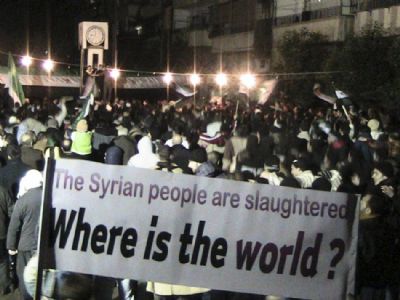"A recent visit to the website of the UN-funded news agency Integrated Regional Information Networks (IRIN) provides a quick tour of the world's forgotten miseries: reports of child labour in Zimbabwe, profiles of the jobless in Sri Lanka, grisly accounts of ethnic killings in South Sudan and Central African Republic.
Absent from this chronology of global grief is anything new about Syria, the world's bloodiest humanitarian crisis.
In November, the UN Office for the Coordination of Humanitarian Affairs (OCHA), which funds IRIN, quietly placed a gag order on its news agency. Its network of journalists were ordered to halt any reporting about the crisis in Syria, which has displaced millions and cost the lives of more than 130,000, according to UN sources...
OCHA had snuffed IRIN because of concerns that its reporting might complicate delicate diplomatic negotiations on access to needy Syrians, and also because its coverage often pointed out shortcomings in the United Nations' humanitarian relief effort in Syria, where more than 2.5 million people have received little or no humanitarian assistance...
Some diplomats said IRIN's reporting was curtailed to avoid the potential for an awkward story offending any of the key players. The interests of free reporting, it was feared, might clash with the United Nations' efforts to pursue quiet diplomacy...
[T]he challenges to IRIN's editorial independence have extended beyond Syria. Senior UN officials have squelched reports dealing with sensitive issues in Sri Lanka, Turkey, and Iraq, where UN officials blocked publication of a story about the legacy of the 2003 bombing of a UN compound that killed 22 people."
January 16, 2014
Why is the UN censoring its own Syria news?

UN-funded news agency ordered to halt reports on Syrian crisis
Date
January 16, 2014
Title
Why is the UN censoring its own Syria news?
IRIN network of journalists were ordered to halt any reporting about the crisis in Syria, Gulf News
IRIN network of journalists were ordered to halt any reporting about the crisis in Syria, Gulf News
Author(s)
Gordon Lubold
Original Source
